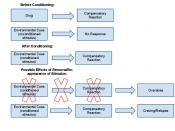Human Beings and Conditioning: Hand-Out We all have natural signals in our nervous systems. There are both internal and external sources that give us these signals. An internal signal would be your stomach signaling your brain that it is hungry. The need for exercise and warmth are also internal signals. We also have automatic signals such as to secure oxygen and liquids. These signals are usually called Drives.
Many human drives have and can be modified. All humans are conditioned in different ways. Our natural human drives can also be changed through simple conditioning. An example of our natural drives being altered is by our culture that tells us what kinds of food are acceptable, our natural drive to satisfy food intake really doesn't care what kind of food we eat.
One of the ways that psychologists say we learn, can be called: Classic Conditioning: The human being is becoming weaker on its drives; the human now becomes more open and apt to be influenced by others.
Unconditioned Stimulus: an entity that can already elicit a response.
Unconditioned Response: An entity that is already elicited by a stimulus.
Unconditioned Relationship: An existing stimulus-response connection.
Conditioning Stimulus: A new stimulus we deliver and at the same time we give the old stimulus.
Conditioned Relationship: The new stimulus-response relationship we created by associating a new stimulus with an old response.
Many ads on television and in magazines prominently feature attractive women wearing sexy clothing. The young women (Unconditioned Stimulus) naturally elicit a favourable, mildly arousing feeling (Unconditioned Response) in most men. The product is simply associated with the effect.
This is an ad for GNC health stores and is an example of everyday classical conditioning.


